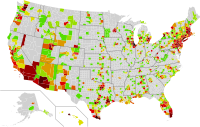Template:Article of the week
Infectious disease informatics (IDI) is a multidisciplinary field of science that focuses on "the development of the science and technologies needed for collecting, sharing, reporting, analyzing, and visualizing infectious disease data and for providing data and decision-making support for infectious disease prevention, detection, and management." The field has expanded over time from analyzing public health laboratory data for potential disease vectors to a more robust syndromic surveillance of epidemiological factors and and to more advanced bioinformatic approaches towards microbial, biomarker, and computational research.
Infectious disease informatics can help tackle problems and tasks such as optimizing developed antimicrobials, improving vaccines, discovering biomarkers for transmissibility and clinical outcomes of infectious diseases, and developing research into host-pathogen interactions. A few unique considerations must be made in IDI informatics applications, including the confidentiality of any included personal health information (PHI) and the non-binary nature of user access privileges. For example, public health director of a certain region may be able to contribute a dataset for analysis, but they'll have to ensure the right balance of PHI to meet local, state, and federal regulations. (Full article...)
Recently featured: National Institute for Occupational Safety and Health, Ambulatory surgery center, Data center










